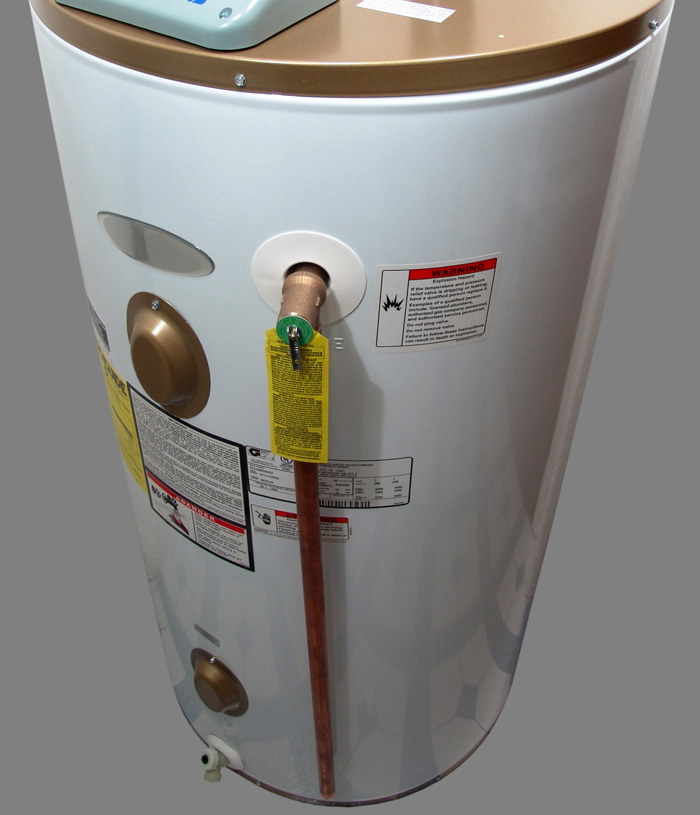
Your home’s water heater and HVAC system have a good bit in common. Both are appliances most people forget they even have and don’t think about until they stop working properly or break. They also both require regular service in order to ensure the highest level of safety and efficiency.
There are 3 different types of residential water heater. The 2 most common are gas and electric water heaters. They employ the use of a storage tank with either a gas burner at the bottom or an electric coil as a heat source that heats the water stored in the tank to a set temperature. There is also a newer option called a tankless (or instantaneous/demand) water heater. They are exactly what the name suggests — they lack a storage tank, and heat water directly through the water lines running to wherever you are drawing hot water from (i.e. bathroom sink).
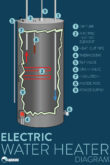
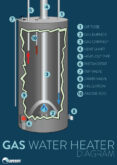
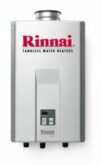
With tank-storage water heaters, there are several risks associated with them. If you have a gas water heater, there are the typical risks that come with burning any type of combustible gas such as leaking lines (if you smell rotten eggs, call someone IMMEDIATELY!) explosions (if leaking gas is ignited by the burner, it makes for a fiery blast), pressure buildups, etc. In a gas water heater, these risks are elevated.
Tank-storage water heaters draw water from your well or municipal water line. They do not have a means of filtering the water they take in, just like your kitchen sink (without a Brita filter). Minerals and sediment are pulled in with the water and settle at the bottom of the tank. In a gas water heater, accumulating sediment causes the burner to have to run longer and the system to work harder to heat to your temperature setting. This causes overheating, pressure buildup, and faster wear and tear on your water heater (just like buildup of dirt on your HVAC system’s coils, blower, and returns causes motors to burn out and systems to run longer, harder, and less efficiently). It is crucial that you have your tank flushed annually so that sediment can be drained and cleaned out from the bottom. (We can do that for you!)
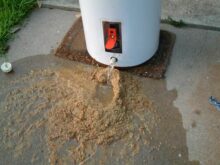
Rust and corrosion also build up in and around your the water heater. Tank-storage systems come with a built-in defense mechanism for rust. The anode rod is designed to rust in place of the tank. But, once the rod has deteriorated, which takes anywhere from 2-5 years, your tank will begin to rust from the inside out. The tank is made from steel, which is largely comprised of iron, meaning it is very prone to rust and corrosion. It is a good idea to inspect your water heater’s anode rod once every 2 years, but if you haven’t recently, but have noticed either a rusty brown color in your hot water or smell rust in the water, it’s probably a good bet that your water heater has rust in it. If you ignore or neglect it, you are putting yours and your family’s health at risk as well as your safety.
Another serious risk that comes with neglecting to service your water heater is pressure buildups. Excessive pressure can make for a scenario you’d see in a Farmers commercial.. https://www.ispot.tv/ad/oFqL/farmers-insurance-sesame-street-not-so-handy-monster-featuring-jk-simmons
Pressure builds up when your temperature is set too high. The ideal temperature setting for a hot water heater is anywhere between 120 and 125 degrees Fahrenheit. Anything more, not only creates more intense pressure inside your tank, but puts you at serious burn risk. According to the burn foundation, it only takes 1 second of exposure to water at 156 degrees to cause third-degree burns ( 2 secs at 149 degrees, 5 secs at 140, and 15 secs at 133).
Your water heater has a safeguard from pressure buildups attached to it. Tank storage systems have what is called the T/P valve (Temperature/Pressure valve), which is designed to open when the pressure or water level hits a certain point and drain some of the heated water from the tank. You should test the T/P valve at least twice per year. This is done by turning the switch up for 5 seconds. If scalding hot water comes out, it’s fine. T/P valves have been known to develop leaks over time, which causes pressure buildup in the tank, since it continually runs like a toilet that can’t finish filling up. It is also a good sign the valve has gone bad if it is constantly opens and closes.
If the T/P valve is neglected, and pressure builds up enough, your water heater could be like a balloon on the verge of popping. Except when it goes boom, it becomes part bomb, part rocket.. See this video for a demo of just how powerful, dangerous, and destructive a water heater explosion can be.. https://www.youtube.com/watch?v=rGWmONHipVo
If you have not had your water heater serviced, or are perhaps curious about going tankless, please give us a call at (864)-578-7575 or visit or click “get started” on our website today! We would be more than happy to serve you!